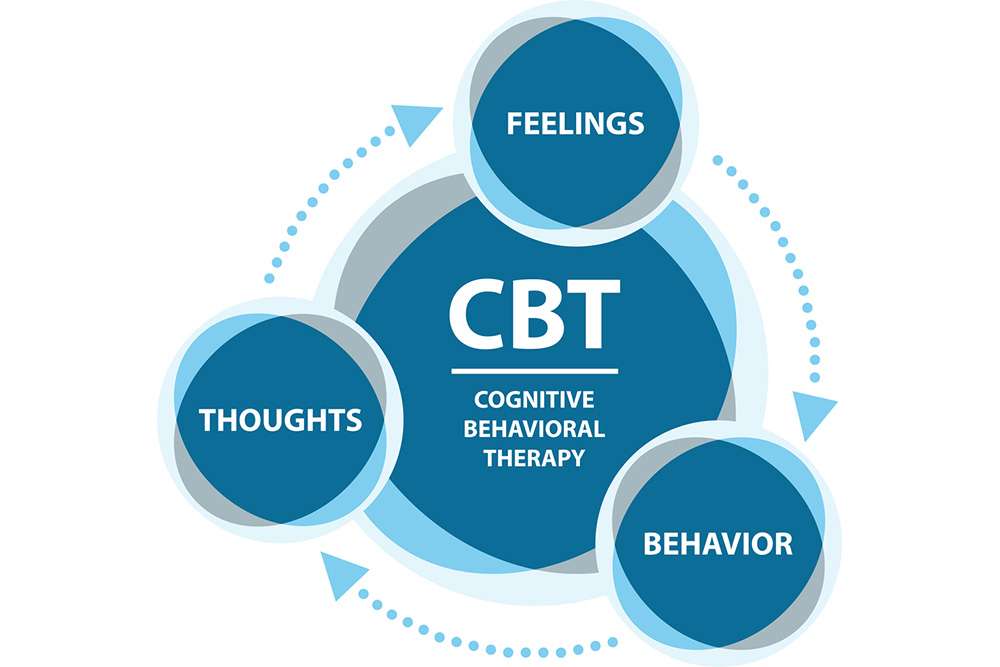2025-06-02

Anxiety disorders can significantly impact a person’s day-to-day life. Whether it is generalized anxiety, panic attacks, social anxiety, or specific phobias, these conditions can cause persistent worry, fear, and physical symptoms.
Fortunately, cognitive behavioral therapy for anxiety (CBT) is one of the most effective treatments available. It brings individuals the tools to manage their anxiety and gain more control over their thoughts, emotions, and behaviors.
Cognitive Behavioral Therapy (CBT) is a therapeutic approach that helps people identify and alter the negative behaviors and thought patterns that contribute to their emotional struggles. The therapy follows the concept that our behaviors, feelings, and thoughts are interconnected. With unhelpful thoughts, we can influence our emotions and behaviors in a more positive direction.
For adults dealing with anxiety, CBT is particularly effective because it targets the root cause of anxiety, such as irrational thoughts and unhelpful beliefs, and helps individuals develop healthier ways of thinking and reacting to anxiety-provoking situations. CBT is structured, goal-oriented, and can be tailored to meet the specific needs of the individual.
The primary goal of cognitive behavioral therapy for anxiety is to help individuals understand the relationship between their thoughts, emotions, and behaviors. Here’s how CBT works to help manage anxiety:
One of the most common features of anxiety is the presence of distorted or negative thinking. People with anxiety often have automatic thoughts that lead them to feel fearful, worried, or stressed. For example, someone with social anxiety might believe, “Everyone will think I’m awkward,” even when there is no evidence to support this.
CBT helps one identify these negative patterns of thought and challenge them. In therapy, patients are taught how to evaluate their thoughts, question their validity, and replace them with more realistic and balanced beliefs. For example, instead of believing, “Everyone will think I’m awkward,” a person might reframe the thought to, “I may feel nervous, but most people are focused on themselves, not me.”
This cognitive restructuring helps break the cycle of negative thinking that fuels anxiety.
People with anxiety often avoid situations that make them feel anxious. While avoidance may offer short-term relief, it can actually make the anxiety worse in the long run. Anxiety therapy incorporates behavioral activation to help individuals gradually confront the situations they fear in a safe and controlled manner.
Exposure therapy is a specific form of behavioral activation used in CBT. It involves exposing individuals to anxiety-inducing situations step-by-step, starting with less stressful scenarios and gradually working up to more challenging ones. Repeatedly facing these fears, individuals learn that the feared outcomes are often much less likely than anticipated, and their anxiety diminishes over time.
For example, someone with a fear of public speaking might begin by practicing speaking in front of a small group of friends before gradually working up to speaking in front of a larger audience. This helps reduce the avoidance behaviors that perpetuate anxiety and builds confidence in handling anxiety-provoking situations.
A key component of CBT is teaching individuals coping skills that can help them manage anxiety when it arises. These skills include relaxation techniques, deep breathing exercises, mindfulness practices, and problem-solving strategies. The goal is to offer individuals with tools they can use at the moment to manage their anxiety symptoms effectively.
For example, mindfulness helps individuals focus on the present moment without judgment, which can help reduce the constant worrying associated with anxiety. Deep breathing and relaxation methods help individuals calm their physical symptoms of anxiety, such as rapid heartbeat and shallow breathing.
Over time, CBT helps individuals develop a new mindset and approach to anxiety. Instead of seeing anxiety as something overwhelming or out of their control, they learn to view it as a manageable emotion that they can control through their thoughts and actions. CBT encourages people to take ownership of their mental health and empowers them to make positive changes.
With a new, more positive outlook, individuals can feel more confident in managing future anxiety-provoking situations. This mindset shift is one of the most powerful outcomes of CBT.
CBT also helps individuals build emotional resilience, which is the ability to cope with stress and adversity. For those with anxiety, it can feel as though anxiety will overwhelm them in difficult situations. However, CBT teaches individuals to approach challenges with a more balanced mindset and recognizes that they have the strength to manage their emotions.
Individuals are better equipped to face life’s difficulties without feeling overwhelmed by anxiety by developing emotional resilience. This added layer of emotional strength helps individuals feel more in control of their mental health and less vulnerable to stressors.
CBT for anxiety uses several key techniques to help individuals understand and manage their anxiety. These techniques are practical, structured, and goal-focused. Some of the most common techniques include:
Cognitive restructuring is the process of identifying negative patterns of thought and replacing them with more positive and realistic alternatives. This technique is particularly helpful in reducing the irrational beliefs that contribute to anxiety.
As discussed earlier, exposure therapy is a key technique in CBT that gradually exposes individuals to feared situations. This will help them learn that their anxiety is often disproportionate to the actual risk. This gradual exposure helps reduce avoidance and fear over time.
Mindfulness involves staying in the present moment and focusing on what is happening around you, rather than worrying about the future. CBT often includes mindfulness techniques to help individuals become more aware of their thoughts and feelings.
Relaxation exercises, such as deep breathing and progressive muscle relaxation, are also commonly used to help individuals reduce physical symptoms of anxiety.
A thought record is a tool used in CBT to help individuals track their thoughts and identify patterns of negative thinking. By writing down their thoughts, individuals can review them later, assess their accuracy, and challenge any irrational beliefs. This technique is especially helpful in identifying automatic negative thoughts that fuel anxiety.
CBT is one of the most researched and proven therapies for treating anxiety disorders. Studies have shown that CBT can significantly reduce anxiety symptoms and improve overall well-being. In fact, CBT has been found to be as effective, if not more so, than medication for many anxiety disorders.
Unlike medication, which only offers temporary relief, CBT helps individuals develop long-term coping skills that last well beyond therapy. These skills enable individuals to manage anxiety even after therapy ends. This allows them to face future challenges with greater confidence, resilience, and emotional stability in both personal and professional aspects of life.
For individuals who prefer not to rely on medication, CBT for anxiety offers a medication-free approach that emphasizes personal growth and behavioral change. It focuses on changing thoughts and behaviors. It provides practical strategies that empower individuals to take control of their anxiety naturally while promoting self-awareness, autonomy, and sustained mental wellness.
With the tools learned in CBT, individuals are better able to manage anxiety in their daily lives. They can engage in activities they once avoided, improve their relationships, and reduce the impact of anxiety on their overall well-being.
CBT can be beneficial for individuals experiencing a range of anxiety disorders. Here are some signs that it might be time to consider CBT:
If you find that anxiety is impacting your ability to function or enjoy life, seeking cognitive behavioral therapy might be a helpful step toward feeling better.
Thought Wise Counseling & Neuropsychology Jacksonville specializes in cognitive behavioral therapy for anxiety to help individuals gain control over their anxiety.
Our therapists work with you to identify negative thought patterns, teach coping strategies, and help you manage anxiety in a healthy way. If you are dealing with depression therapy or need a psychological evaluation, our team is here to offer support and guidance.
Cognitive behavioral therapy for anxiety is a highly effective treatment for those struggling with anxiety disorders. By identifying negative thoughts, challenging irrational beliefs, and using practical coping strategies, CBT empowers individuals to take control of their mental health. It offers long-term relief and improves overall quality of life, which makes it an excellent option for managing anxiety.
If you or someone you know is struggling with anxiety, consider CBT as a treatment option. At Thought Wise Counseling & Neuropsychology Jacksonville, we are committed to helping you manage anxiety and build a healthier future.
Contact us today.

ThoughtWise Clinical Psychology and Neuropsychology provides quality services that guide treatment, enrich life, and enhance our overall mental health and cognitive abilities in Jacksonville and throughout the state of Florida. On their blog, they share insightful tips on managing and improving mental health and clarity in day to day life.

Contact us today to see if Thought Wise and our clinical psychologists are the right fit for your needs.